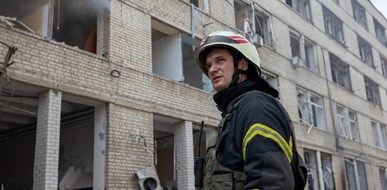[Book review] James Patrick Sexton reviews ‘Law-Making and Legitimacy in International Humanitarian Law’, edited by Heike Krieger and Jonas Püschmann
Published 4 May 2022
Photo by David Peinado from Pexels - Firefighter in front of a residential building destroyed by shelling
James Patrick Sexton, junior researcher at the T.M.C. Asser Institute, recently published a book review of Heike Krieger and Jonas Püschmann’s edited volume, Law-Making and Legitimacy in International Humanitarian Law (Elgar 2021), in the Journal of International Humanitarian Legal Studies.
The book under review, Law-Making and Legitimacy in International Humanitarian Law, examines recent trends in the development of international humanitarian law (IHL), the law which regulates situations of armed conflict. In Sexton’s opinion, the book is an excellent contribution to scholarship in the area, providing multiple new perspectives from a wide variety of authors on the law’s past, present, and future.
Impact of the Russian invasion of Ukraine
Although the book under review was published in the latter half of 2021, Sexton analyses its conclusions from the viewpoint of a drastically changed world - one in which the Russian Federation has launched a full-scale military invasion of Ukraine. With these terrible developments, international humanitarian law - the focus of the book – has and will continue to undergo an existential challenge, as allegation of violations and shortcomings mount. For Sexton, however, Law-Making and Legitimacy in International Humanitarian Law, ‘despite being published immediately prior to the Russian invasion, […] remains an apt assessment of IHL’s present condition and unclear future; perhaps even more so than before’.
Read the book review here.
James Patrick Sexton is a junior researcher in the Asser research strand ‘In the public interest: accountability of the state and prosecution of crimes’. This research strand examines i) the accountability of states – individually and collectively (for instance at the level of the United Nations or the European Union) – in light of public interest standards in the context of counter-terrorism; and ii) the prosecution of individuals for international and transnational crimes in the public interest. Moreover, to ensure both the accountability of the state and the prosecution of individuals, this strand will also investigate iii) the role of journalists, the (new) media, human rights NGOs and academics in protecting and promoting public interest standards.
